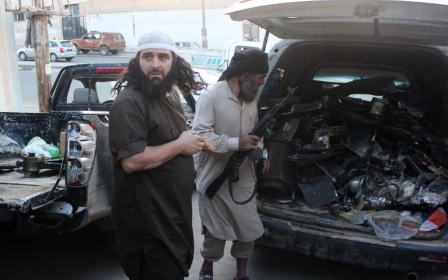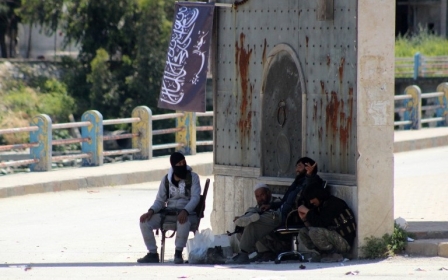Eyebrows are raised at Al-Nusra leader's dismissal of 'Khorasan' group

An interview on Al-Jazeera Arabic (AJA) with Abu Mohamed al-Jolani, leader of al-Nusra Front – the affiliate of al-Qaeda in Syria – has raised more questions about both the group's long-term plans in the conflict and intelligence gathering on the part of Western governments.
One of Jolani's most suprising revelations – to some, anyway – was that he had never heard of the “Khorasan group” claimed by US intelligence as a Nusra splinter group who were specifically tasked with striking the West.
“The so-called Khorasan group, supposedly active within our ranks, doesn’t exist,” he told AJA journalist Ahmad Mansour. “We first heard about it via the media after the US-led coalition bombed us. It is merely a Western invention to justify the bombings on us.”
He acknowledged that there were some “brothers from Khorasan” - an archaic term for a region encompassing parts of Afghanistan and Pakistan – but denied that any part of Nusra was intent on attacking the West, citing an instruction from al-Qaeda head Ayman al-Zawahiri.
Reactions to the supposed relevation were divided, with some analysts claiming that their initial scepticism had been vindicated - counter-terrorism analyst Aaron Zelin of the Washington Institute claimed that it proved his suspicions that the US had simply mislabelled Afghan and Pakistani Nusra fighters.
Associated Press first revealed the existence of the group in September 2014, quoting an unnamed official describing a “cadre of veteran al-Qaida fighters from Afghanistan and Pakistan who travelled to Syria to link up with the al-Qaida affiliate there, the Nusra Front”.
AP added: “But the Khorasan militants did not go to Syria principally to fight the government of President Bashar Assad, US officials say. Instead, they were sent by al-Qaida leader Ayman al-Zawahiri to recruit Europeans and Americans whose passports allow them to board a US-bound airliner with less scrutiny from security officials.”
Though the eventual US decision to begin a bombing campaign in Syria was primarily driven by the rise to prominence of the Islamic State (IS), the existence of Khorasan – a group who supposedly posed a specific threat to the US and Europe – was another major factor in selling the generally unpopular scenario of getting bogged down in another war in the Middle East to a fearful public.
“In terms of threat to the homeland, Khorasan may pose as much of a danger as the Islamic State,” warned director of National Intelligence, James Clapper.
When pressed by reporters on when an attack could be expected from the group, details were sketchy.
“I don’t know that we can pin that down to a day or month or week or six months,” said Pentagon spokeman, John Kirby. “We can have this debate about whether it was valid to hit them or not, or whether it was too soon or too late… We hit them. And I don’t think we need to throw up a dossier here to prove that these are bad dudes.”
Last week, Michael Morell, a former CIA deputy director, said the Khorasan Group was “the external operations arm for al-Nusra.”
He added: “They are intending to attack Western Europe and the United States. They are a greater threat - direct threat - than is ISIS.”
The 47th, an activist and analyst based in Syria, told Middle East Eye that he understood that 'Khorasan', as such, did not exist as a separate body within Nusra.
“I mean, I'm pretty sure it has individuals who plot and connect with potential sleepers,” he said. “But to claim it is an entity or a pre-existing group - the US is carving out a new jihadist entity that jihadists themselves don't know about and blowing it out of proportion.”
“It's like calling a group of vegetarians 'vegetable terrorists' just to seclude or serve a mission.”
He said that he presumed Jolani was lying about having no intention of targeting the West.
“Of course he is,” he said. “But then cut the bull and just call all of JAN [Jabat al-Nusra] 'Khorasan.'”
“I've been monitoring jihadists and their sympathisers since 2011. I think even they laugh at how the US calls JAN targets in Syria 'Khorasan'.”
The man credited as head of the group was one Muhsin al-Fadhli, acknowledged as a senior leader of al-Qaeda. He was reported as killed by the US shortly after the beginning of the bombing campaign in Syria but was later upgraded to alive and his current whereabouts are unknown.
He has been touted as one of the confidants of the later al-Qaeda leader Osama bin Laden, to the point of being one of the select few who were informed of the 9/11 attacks in New York prior to their implementation.
In March 2015, an article in the Telegraph alleged that Fadhli had been responsible for the radicalisation of British IS fighter Mohammed Emwazi, nicknamed "Jihadi John" in the UK press.
According to Kuwaiti security sources, Emwazi met Fadhli in Kuwait in 2007, along with Saudi Arabian student and bombmaker Khalid al-Dossary and “so profound were the effect of the two men's ideas on Emwazi that he renounced his Shia faith and converted to the Sunni creed adhered to by the Islamic State of Iraq and the Levant.”
“The revelation that Emwazi met al-Fadhli provides a new insight into his development as a ruthless killer,” read the article. “No details have been disclosed over where and how the meeting took place and it is unknown if the two remained in contact. “
Though there is little more evidence than what was revealed by the Kuwaiti government, this account would appear to confirm allegations that Khorasan's leadership were involved in recruiting Westerners.
“My own sense is that this is a very murky area," said Shashank Joshi, a research fellow at the Royal United Services Institute. “It's a little too early to scoff and say that this confirms all of our suspicions that Khorasan group is a fabrication of a paranoid American intelligence community.”
He suggested that the interview was an attempt by Jolani to reposition Nusra within the make up of Syrian opposition groups and shave off some of the features which have given the group a controversial image.
“The narrative he seems to have been propounding in yesterday's interview is the idea that it's a local group with local aims and while he isn't disavowing the link with al-Qaeda, he isn't instructing his group to attack targets abroad," he said. "Both in terms of his interest in avoiding undue pressure on his own group and securing as much broad support within Syria as he can, he has a strong interest in disavowing of anything called the Khorasan group within his movement or anything attached to it.”
“I think that we have strong reasons to be suspicious of anything he says about Khorasan and to take his denials with a considerable degree of skepticism.”
New MEE newsletter: Jerusalem Dispatch
Sign up to get the latest insights and analysis on Israel-Palestine, alongside Turkey Unpacked and other MEE newsletters
Middle East Eye delivers independent and unrivalled coverage and analysis of the Middle East, North Africa and beyond. To learn more about republishing this content and the associated fees, please fill out this form. More about MEE can be found here.




